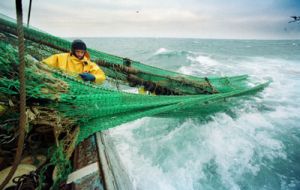MercoPress. South Atlantic News Agency
Fresh report says world’s depleted fisheries can be saved
 “Like a crime scene investigating for over-fishing”
“Like a crime scene investigating for over-fishing” There is fresh hope that the world's depleted fisheries can be saved from collapse, says a team of researchers. They said that efforts introduced to halt over-fishing in five of the 10 large marine ecosystems they examined were showing signs of success.
A combination of measures - such as catch quotas, no-take zones, and selective fishing gear - had helped fish stocks recover, they added. Details of the two-year study by 19 marine scientists appear in Science.
However, the team warned a large percentage of the world's fisheries remained unmanaged so much work still had to be done to halt the damage caused by over-fishing.
The authors said the study, which looked at key fisheries in Europe, North America and New Zealand, had two goals:
The first was to examine current trends in fish stocks, while the second was to identify what tools had been used in attempts to replenish fish numbers.
“This was a little like a crime scene investigation for over-fishing,” said lead author Boris Worm, a marine biologist from Dalhousie University, Canada.
“We wanted to find out what were the tools that had been used to adjust exploitation rates and reduce the pressure on fish stocks,” said Dr Worm.
“This allowed us to perform not only a much more in-depth assessment of fishery trends, but also - for the first time - to quantify the trends of exploitation rates, which is the proportion of fish removed from the ecosystem each year,” explained Dr Worm.
“This is really quite a big step forward because the exploitation rate is the primary driver of depletion and collapse, just as CO2 is the primary driver of climate change.”
However, he added that the exploitation rate was the one factor that could be adjusted by direct human intervention, such as introducing management practices.
The authors observed: “Some of the most spectacular rebuilding efforts have involved bold experimentation with closed areas, [fishing] gear restrictions and new approaches to catch allocations and enforcement.”
But they warned that the signs of recovery should not be interpreted by policymakers as a sign that all was well beneath the waves.
The majority of fisheries is still in trouble, and was not being managed or regulated properly. But Dr Worm said that the team's “watershed paper” offered a blueprint for sustainable fishing.
”It clearly shows what needs to be done to not only avoid fisheries collapse, but to actually rebuild fish stocks and ecosystem”. (BBC)




Top Comments
Disclaimer & comment rulesCommenting for this story is now closed.
If you have a Facebook account, become a fan and comment on our Facebook Page!